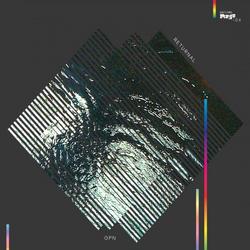R Plus Seven - Oneohtrix Point Never
$ 3.99 – $ 5.99
Over the course of Oneohtrix Point Never's discography, Daniel Lopatin managed to sound markedly different from album to album while keeping an overarching aesthetic.
His Warp debut, R Plus Seven, often feels like a microcosm of that approach; these shape-shifting songs hold together more because of Lopatin's bold sonic palette than any unifying concept.
Aside from the opening track, "Boring Angel," he downplays the drones that made up the heart of his earlier work (and Replica, to a lesser extent) in favor of bright, briskly applied tones that, on the surface, seem like the opposite of his usual modus operandi.
This fragmentation could be seen as a variation of Replica's choppy recontextualizing, though the results are dizzying rather than hypnotic: "Americans" hops from environmental sounds to zapping synths to cheery strings to choral vocals in what feels like the musical equivalent of a series of smash cuts.
Similarly, Lopatin trades one kind of nostalgia for another: instead of evoking (and sampling from) the '70s and early '80s as his earlier work did, the brittle, sometimes cheap MIDI-esque sounds he sprinkles throughout R Plus Seven recall the late '80s and early '90s.
The preponderance of choral pads on tracks such as the fittingly named "Still Life" give the album an eerie, uncanny valley-ish undercurrent, while "Along"'s mix of piping synth flutes, exotic percussion, and sax sounds like new age and smooth jazz run through a woodchipper.
However, thanks to the light-handed arrangements, what could be cheesy or ironic more often than not feels forward-looking.
Despite the dots and dashes of sound at any given moment, the album gives an overall impression of sleekness, and its subversive glossiness suggests that its tracks were made from pop songs that were shattered into shards that are as alluring as they are difficult to piece together.
Occasionally, Lopatin tones down the hyperactivity a bit, resulting in highlights like "Problem Areas," which is carried by rubbery bass and a stairstepping brass motif, and "Zebra" and "Chrome Country," which both use warm-sounding synths to surprisingly emotional effect (even if the latter song tweaks the choral pad so violently that it sounds like it's shrieking).
By conventional standards, R Plus Seven isn't a widely appealing crossover for Lopatin's new label.
Yet in an almost perverse way, the playful spirit of these tracks and their lively sounds make for some of his most accessible work yet.
For the most part, the album showcases Oneohtrix Point Never's restlessness and ambition in flattering ways; if it's equal parts mystifying and beautiful, it's also a puzzle well worth trying to figure out.
| Title/Composers | Performer | Listen | Time | Size | Size | |
|---|---|---|---|---|---|---|
| 1 | Boring AngelDaniel Lopatin | Oneohtrix Point Never | Play | 04:16 | 9 MB | 26 MB |
| 2 | AmericansDaniel Lopatin | Oneohtrix Point Never | Play | 05:18 | 12 MB | 35 MB |
| 3 | He SheDaniel Lopatin | Oneohtrix Point Never | Play | 01:33 | 3 MB | 7 MB |
| 4 | Inside WorldDaniel Lopatin | Oneohtrix Point Never | Play | 03:53 | 8 MB | 19 MB |
| 5 | ZebraDaniel Lopatin | Oneohtrix Point Never | Play | 06:44 | 15 MB | 35 MB |
| 6 | AlongDaniel Lopatin | Oneohtrix Point Never | Play | 05:23 | 12 MB | 24 MB |
| 7 | Problem AreasDaniel Lopatin | Oneohtrix Point Never | Play | 03:06 | 7 MB | 17 MB |
| 8 | CryoDaniel Lopatin | Oneohtrix Point Never | Play | 02:47 | 6 MB | 13 MB |
| 9 | Still LifeDaniel Lopatin | Oneohtrix Point Never | Play | 04:53 | 11 MB | 26 MB |
| 10 | Chrome CountryDaniel Lopatin | Oneohtrix Point Never | Play | 05:15 | 12 MB | 27 MB |
| 43 mins | 98 MB | |||||
| 43 mins | 234 MB | |||||
| Artist | Job | |
|---|---|---|
| 1 | Robert Beatty | Artwork, Design |
| 2 | Paul Corley | Mixing, Producer |
| 3 | Paul Evans | Engineer |
| 4 | Daniel Lopatin | Art Direction, Composer, Mixing, Producer |
| 5 | Oneohtrix Point Never | Primary Artist |
| 6 | Timothy Sacrenti | Photography |
| 7 | Gerge Schwizgebel | Cover Art |
| 8 | Valgeir Sigurðsson | Mastering |
Oneohtrix Point Never
| Quality | Format | Encoding | Description |
|---|---|---|---|
| Standard | MP3 | 320kps 44.1kHz | MP3 is an audio coding format which uses a form of lossy data compression. The highest bitrate of this format is 320kbps (kbit/s). MP3 Digital audio takes less amount of space (up to 90% reduction in size) and the quality is not as good as the original one. |
| CD Quality | FLAC | 16bit 44.1kHz | FLAC is an audio coding format which uses lossless compression. Digital audio in FLAC format has a smaller size and retains the same quality of the original Compact Disc (CD). |




